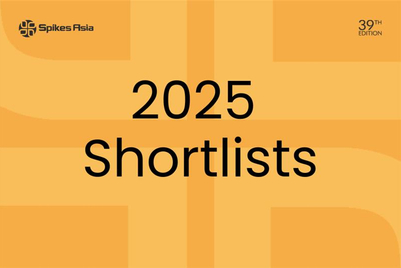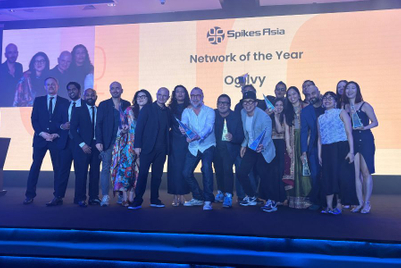
The Spikes Asia Awards for 2025 are just a week away with the winners being announced on April 24. In the run up to the event, the Campaign editorial team pored over The Spikes Asia Awards 2025 shortlist to pick our favourite entries—the way we would if we had been tasked with judging.
With a disclaimer that this is just a fun exercise and has no bearing on the actual winners, the team picks work that they found most personally impressive and resonant among an array of deserving candidates. We reserve the right to say that ‘we told you so’ if any of our picks do in fact make a sweep at Spikes next week.
Nominated by: Rahat Kapur, managing editor, Campaign Asia-Pacific

Campaign: The First Wheelchair Ballkid
Brand: Mastercard
Agency: TBWA Eleven Sydney
Category: Societal innovation
What it’s about and why I think it will win: This campaign sees Mastercard work with Tennis Australia to bring on board the first-ever wheelchair-using ballkid at a Grand Slam tournament. The story revolves around Sonny, a junior tennis player and wheelchair user, who undergoes the same rigorous training and assessment as any other ballkid. What makes this campaign different is its emphasis on equal standards—not creating a separate track, but finding a way to make the existing one accessible.
Mastercard collaborated with Paralympic athletes, engineers, and accessibility experts to modify the role in ways that were meaningful, not performative. The result is subtle and quietly significant: Sonny on court, doing his job without fanfare, seamlessly part of the event. Purpose-driven campaigns often promise big things but settle for awareness. This one focuses on a specific barrier and removes it. There’s restraint in how it’s told, but the shift it represents is profound. For a brand that’s long leaned into ‘priceless’ moments, this is one of the more quietly powerful ones.
Campaign: Deep connect
Brand: Motorola+
Agency: Dentsu Creative, Gurgaon
Category: Product innovation, Societal innovation
What it’s about and why I think it will win: Mobile connectivity is something most people in urban areas take for granted. But in India’s flood-hit regions and remote rural pockets, signal blackouts are common—and often, when people need to reach out most, they simply can’t. 'Deep Connect' tackles that problem head-on. It transforms Motorola phones into a decentralised, peer-to-peer communication network, allowing users to connect with each other even when mobile towers go down or don’t exist at all.
The idea is quietly brilliant. It doesn’t shout about innovation, because it actually is innovation. No gimmicks, no theatrics. Just a practical, tangible solution to a very real issue most people outside these regions don’t even realise exists. What makes this work stand out is that it’s not chasing headlines or engagement. It’s built for impact. And more importantly, it’s built for a demographic that is often left out of the conversation entirely: Rural India. In an industry that frequently centres cities, campaigns like this remind us that real transformation often happens where the spotlight isn’t. This is innovation that’s not only smart—it’s necessary. And that’s why it deserves recognition.
Nominated by: Ravi Balakrishnan, editor, Southeast Asia, Campaign Asia-Pacific

Campaign: What the fast!
Brand: Krungsri First Choice
Agency: Leo, Thailand
Category: Film
What it’s about and why I think it will win: The campaign uses a clever creative device to demonstrate the quick approvals by Thai financial services company Krungsri’s First Choice insurance. The ads are built around potentially problematic situations that would typically require a lot of discussion or negotiation. But instead, they are resolved in the time it takes for people to pass each other on two-wheelers and remain within earshot: typically, anywhere between 10 to 20 seconds. The ‘As fast as FirstChoice approval’ tagline drives home the importance of speed in a typically arduous and time-consuming process.
Insurance commercials from Thailand have often played in the tearjerker territory—for instance, a widely shared ad for Thai Life which chronicles the final thoughts of a father realising he will never be able to reconcile with his estranged son. And so, it is fun to see a campaign at the absolute other end of the spectrum.
The films are also perfect for the attention span of a time-strapped, fidgety audience and do a good job of being intriguing enough to not have a viewer race for the ‘skip ad’ button. The final pay-off makes very few demands on the audience, effectively driving home the message that respect for time and speed are hardcoded into First Choice.
While a lot of the conversation around advertising over the last half decade has been about building the pipes to get an ad across to a warm body, this campaign clearly understands how important it to have something interesting to say once it gets there.
Campaign: See the Signs of Silent Separation
Brand: Ariel
Agency: BBDO India
Category: Creative Effectiveness
What it’s about and why I think it will win: The most recent iteration of BBDO’s long-running Share the Load campaign for Ariel detergent in India taps into the phenomenon of elderly couples gradually drifting apart. Among the reasons are an unequal workload, with women being frequently saddled with the burden of domestic chores. In a country where divorce is stigmatised, married partners remain together, even as a growing emotional gulf separates them. The film captures the moment of realisation, spurred by the conversation a man has with his grown daughter.
When Ariel first began Share the Load in 2015, it was among the more interesting purpose-led campaigns in India and sparked a huge debate on why and whether Ariel should take on such an issue. Over nearly a decade, the campaign has addressed how young men are brought up, and the patriarchal patterns evident in even the most ‘progressive’ Indian households. To have endured with so many fresh themes indicates a rare courage of conviction from both agency and brand.
Through its history, the campaign has sparked interesting and sometimes uncomfortable conversations around gender roles over dinner tables and on private WhatsApp groups, a rarity in an era where advertising is often easily ignorable background noise.
Starting in the golden age of purpose-driven work, to a time when it appears to be open season on everything purpose-related, and with a resurgent extremely vocal men's rights movement in India—both online and offline, I wonder if the campaign will continue in its current shape and form. If it does, it will be a great example of purpose done right, and a testament to the courage and commitment it takes to go beyond the superficial and performative. If it doesn’t, ‘See the Signs of Silent Separation’ is a fitting last hurrah for Share the Load and its gentle rebellion against established gender norms in India.
Nominated by: Minnie Wang, senior reporter, Greater China, Campaign Asia-Pacific

Campaign: IKEA flooded room
Brand: IKEA
Agency: VML Thailand
Category: Print & Publishing

What it's about and why I think it will win: IKEA and VML Thailand have earned two nominations in this category for a powerful campaign created in response to the devastating floods in Northern Thailand in October 2024, the worst in over 30 years. The disaster displaced thousands of families as floodwaters and mud swept away homes and livelihoods.
The campaign united the community around a shared mission: to help rebuild the homes lost to the floods. In a creative twist on post-disaster images, the brand and the agency reimagined the Ikea’s iconic room ads, usually known for the perfectly styled interiors, as flooded spaces, vividly capturing the scale of destruction and the urgency of recovery. In partnership with The Mirror Foundation, an organisation deeply involved in supporting flood-affected communities, as well as VML Thailand, IKEA is committed to ensuring that every donated or repurchased piece of furniture reaches those who need it the most.
Campaign: 24 Hours to be a Kid Again
Brand: McDonald’s China
Agency: Leo
Category: Brand experience & Activation

What it's about and why I think it will win: In one of 2024’s most memorable online and in-store brand experiences in China, McDonald’s and Leo Burnett transformed Children’s Day into a nationwide celebration of childhood nostalgia. The campaign generated five billion total impressions, including over five million within just ten hours.
A highlight of the activation was the rapid sell-out of 700,000 retro-style walkie-talkies, which quickly became social currency across social media platforms on Children’s Day. The activation combined limited-edition products, live events, and a high-profile collaboration with artist Mr Doodle to invite kidults, adults who grew up with McDonald’s, to rediscover the joy of their childhood. From beloved items like McNuggets to immersive in-store experiences, the campaign reignited emotional connections with a generation raised on Happy Meals.
Nominated by: Matthew Keegan, Campaign Asia-Pacific

Campaign: Hometeams #Sharetheload
Brand: Ariel India
Agency: BBDO India
Category: Glass: The award for change
What it's about and why I think it will win: Ariel’s latest #ShareTheLoad campaign spotlights the mental load on women and encourages husbands to step up and become trusted allies in household responsibilities, urging couples to work together as equal partners. Through a compelling film featuring Aisha, a professional woman hesitant to accept a work trip due to concerns about her partner managing the home alone, Ariel highlights the common dilemma many women face balancing career and household duties. The story emphasises the importance of men sharing both the physical and mental aspects of running a household, to enable a true team dynamic at home.
The #ShareTheLoad campaign is a simple yet powerful movement that deserves a nod for consistently challenging outdated gender roles since 2015. By sparking important conversations about the unequal burden of housework on women, it proves that small changes can drive meaningful social impact—going beyond marketing to challenge deep-rooted societal norms.
Campaign: The Girl Who Played The Tutari
Brand: Coca Cola
Agency: VML
Category: Music
What it's about and why I think it will win: Coca-Cola, through its Coke Studio Bharat music video 'Bayo', has made a groundbreaking move by challenging an 800-year-old tradition surrounding the Tutari, a traditional Indian wind instrument dating back to the 13th century. Historically, the Tutari’s powerful sound was reserved for significant occasions such as welcoming royalty, signalling war, and celebrating victories, and it was exclusively played by men due to longstanding cultural norms. Traditionally crafted from animal horn and later metal, the heavy instrument symbolised male dominance in its performance.
In a bold and inspiring twist, Coca-Cola democratised the Tutari by featuring a young girl playing it publicly for the very first time, breaking deep-rooted gender stereotypes. This campaign celebrates India’s musical heritage, showing Coca-Cola’s support for progress and culture. It deserves recognition for going against the grain with its bold and inspiring approach to promoting inclusion and empowerment.


.jpg&h=334&w=500&q=100&v=20250320&c=1)


.png&h=334&w=500&q=100&v=20250320&c=1)





.png&h=334&w=500&q=100&v=20250320&c=1)







